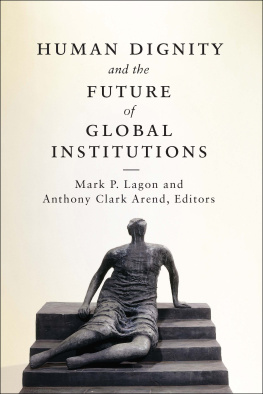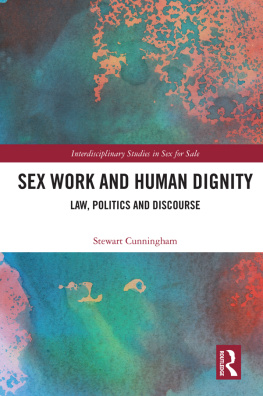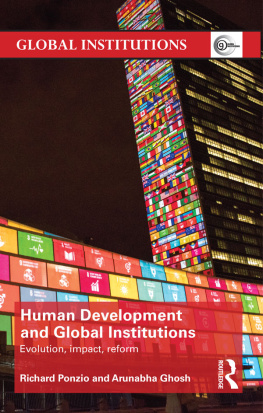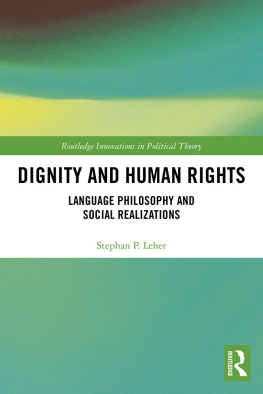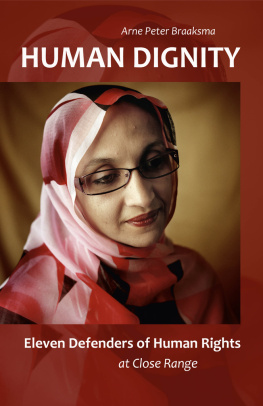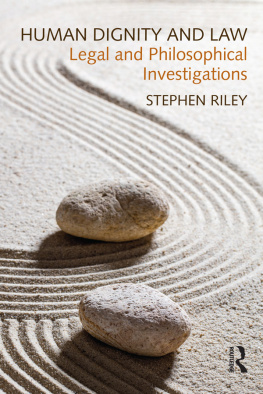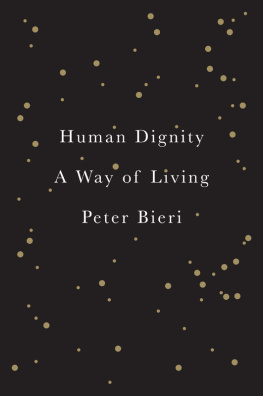2014 Georgetown University Press. All rights reserved. No part of this book may be reproduced or utilized in any form or by any means, electronic or mechanical, including photocopying and recording, or by any information storage and retrieval system, without permission in writing from the publisher.
Library of Congress Cataloging-in-Publication Data
Human dignity and the future of global institutions / Mark P. Lagon and Anthony
Clark Arend, editors.
pages cm
Summary: The 21st century has witnessed a proliferation of international institutions, including traditional intergovernmental organizations, non-governmental organizations, private sector entities, and other partnerships. The premise of this anthology is that these institutions need a common, animating principle in the service of the person, which is the ultimate end of global politics. The concept of human dignity, the editors claim, serves this purpose and transcends the seemingly intractable conflicts in human rights debates: political rights v. social and economic rights. Conceptually, human dignity rests on two principles: exercising agency to realize ones potential, and recognition by society of ones worth. In light of this formulation of human dignity, the anthology has two purposes: First, contributors will examine the degree to which traditional and emerging institutions are already advancing human dignity as a central mission. Second, in the spirit of developing best practices and prescriptive recommendations, contributors will identify strategies, methods, and modalities to make human dignity more central to the work of global institutions.
Includes bibliographical references and index.
ISBN 978-1-62616-119-1 (hardcover : alk. paper) ISBN 978-1-62616-120-7 (pbk. : alk. paper) ISBN 978-1-62616-121-4 (ebook)
1. Dignity. 2. Human rights. 3. Respect for personsLaw and legislation. I. DeGioia, John J. writer of preface. II. Lagon, Mark P. editor. III. Arend, Anthony C. editor.
JC571.H76265 2014
341.2dc23 2014011284
Cover image: Henry Moore, Draped Seated Woman: Figure on Steps 1956. The Henry Moore Foundation. All Rights Reserved, DACS 2014/www.henry-moore.org
This book is printed on acid-free paper meeting the requirements of the American National Standard for Permanence in Paper for Printed Library Materials.
15 14 13 9 8 7 6 5 4 3 2 First printing
Printed in the United States of America
This book is dedicated to MSFS students
past, present, and future
as they work to set the world on fire.
Ad Majorem Dei Glorium inque Hominum Salutem
ACKNOWLEDGMENTS
Human Dignity and the Future of Global Institutions is a collaborative project of members of a true community: the faculty, alumni, students, and friends of the Georgetown University Master of Science in Foreign Service Program (MSFS). Its evolution and insights flow from dialogue in that community, a microcosm of the dialogue we propose in our concluding chapter. As part of this dialogue, the contributors have been intellectual collaborators in an ongoing conversation that transcends their individual contributions.
Institutional support for this project has come from both Georgetown University and the Council on Foreign Relations. We want to thank the Edmund A. Walsh School of Foreign Service at Georgetown, including Dean Carol Lancaster and Senior Associate Dean James Reardon-Anderson, who provided their enthusiasm and help with the production of this volume. We wish to thank Kathleen McNamara and Moira Todd of the Mortara Center for International Studies and Thomas Banchoff and Erin Coleman of the Berkley Center for Religion, Peace and World Affairs at Georgetown University for their partnership with MSFS and their support respectively during the June 7, 2012, and March 19, 2013, conferences that reviewed draft chapters. Thanks to Gina Hart at the MSFS Program for administrative leadership in support of the books contributors. And we would offer a very special thanks to Georgetowns President John J. DeGioia for his support and his willingness to write the preface.
We want to thank the Council on Foreign Relations (CFR), where Mark P. Lagon is Adjunct Senior Fellow for Human Rights, for helping germinate some of the ideas, notably at the first conference on contributors and friends we convened on November 16, 2011. by Mark P. Lagon and Ryan Kaminski was adapted from the Issue Brief, The Global Human Rights Regime, published by the Council on Foreign Relations (CFR) in February 2012. The brief is part of CFRs Global Governance Monitor from the International Institutions and Global Governance program, generously funded by the Robina Foundation.
There are a number of colleagues who offered advice, notional formulations, feedback on chapters, and presentations and comments at conferences we held at CFR and at Georgetown University to whom we want to express our appreciation. They include: Evelyn Aswad, Mathew Carnes, Samantha Custer, Mark Dybul, Stein-Ivar Eide, Lee Feinstein, Felice Gaer, Dylan Groves, Ross Harrison, Ryan Kaminski, Peter Katzenstein, Carol Lancaster, James Lindsay, Katherine Marshall, Kathleen McNamara, Sarah Moran, Alberto Mora, Michael Morfit, Kate Potterfield, Pierre-Richard Prosper, Andrew Reddie, George Shambaugh, Kristen Silverberg, Anne-Marie Slaughter, Karen Stauss, Fred Tipson, Michael Walzer, Matthew Waxman, David Watkins, Jennifer Windsor, and Diane Yeager.
We would also be remiss if we did not signal out two MSFSers. Benjamin Boudreaux, a onetime student and now alumnus who offered welcome and canny research help earlier in the project. And in a special category is Mathew R. Caldwell who as an MSFS student and William V. OBrien Fellow in International Law played a substantial role in the revision and integration of the volume and helped organize a March 19, 2013, conference. His indefatigable energy, judgment, passion, and spectacular good humor were essential to this book coming to fruition.
We have been blessed working with Richard Brown and Deborah Weiner at Georgetown University Press. Their enthusiasm for and insights on improving this project are deeply valued.
Mark P. Lagon enormously appreciates the enthusiasm, support, and love of Elena Lagon and Zofia Lagon. Above all, he cherishes his wife, Susan Sullivan Lagon, for love and emotional backing to the hilt and sage advice to a fellow teacher.
Anthony Clark Arend would like to thank Jaclyn Halpern Bates, Spencer Bates, David Gutschmit, Doug Shaw, and Kevin OBrien for their support throughout this project.
Finally, we want to thank all our students at Georgetown for challenging us and helping us develop our thinking on human dignity. It is to them that we have dedicated this book.


